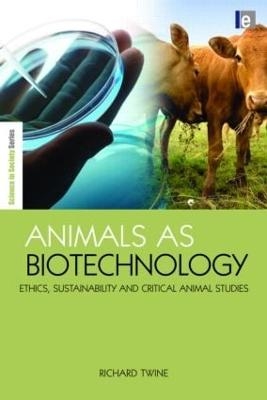
Animals as Biotechnology
Earthscan Ltd (Verlag)
978-1-84407-830-1 (ISBN)
In Animals as Biotechnology sociologist Richard Twine places the question of human/animal relations at the heart of sustainability and climate change debates. The book is shaped by the emergence of two contradictory trends within our approach to nonhuman animals: the biotechnological turn in animal sciences, which aims to increase the efficiency and profitability of meat and dairy production; and the emerging field of critical animal studies - mostly in the humanities and social sciences - which works to question the nature of our relations with other animals.
The first part of the book focuses on ethics, examining critically the dominant paradigms of bioethics and power relations between human and non-human. The second part considers animal biotechnology and political economy, examining commercialisation and regulation. The final part of the book centres on discussions of sustainability, limits and an examination of the prospects for animal ethics if biotechnology becomes part of the dominant agricultural paradigm. Twine concludes by considering whether growing calls to reduce our consumption of meat/dairy products in the face of climate change threats are in fact complicit with an anthropocentric understanding of sustainability and that what is needed is a more fundamental ethical and political questioning of relations and distinctions between humans, animals and nature.
Richard Twine is a Senior Research Associate at Cesagen (ESRC Centre for Economic and Social Aspects of Genomics), Lancaster University, UK.
Introduction: From the Sciences of Meat to Critical Animal Studies
Part I: The Animal and the Ethical
1. Undomesticating the Ethical
2. Toward a Critical Bioethics
3. Thinking across Species in the Ethics of 'Enhancement'
Part II: Capitalizing on Animals
4. Animal Biotechnology and Regulation
5. Biopower and the Biotechnological Framing of the Animal Body
6. Capitalizing on the Molecular Animal: Beyond Limits?
Part III: Capturing Sustainability in the Genome
7. Mobilizing the Promise of Sustainability
8. Searching for the 'Win-Win'? Animal Genomics and 'Welfare'
Conclusion: From the 'Livestock' 'Revolution' to a Revolution in Human/Animal Relations
| Erscheint lt. Verlag | 25.8.2010 |
|---|---|
| Reihe/Serie | The Earthscan Science in Society Series |
| Verlagsort | London |
| Sprache | englisch |
| Maße | 156 x 234 mm |
| Gewicht | 521 g |
| Themenwelt | Medizin / Pharmazie |
| Naturwissenschaften ► Biologie | |
| Naturwissenschaften ► Geowissenschaften ► Geologie | |
| Naturwissenschaften ► Geowissenschaften ► Geophysik | |
| Sozialwissenschaften ► Soziologie | |
| Technik ► Umwelttechnik / Biotechnologie | |
| ISBN-10 | 1-84407-830-2 / 1844078302 |
| ISBN-13 | 978-1-84407-830-1 / 9781844078301 |
| Zustand | Neuware |
| Haben Sie eine Frage zum Produkt? |
aus dem Bereich


